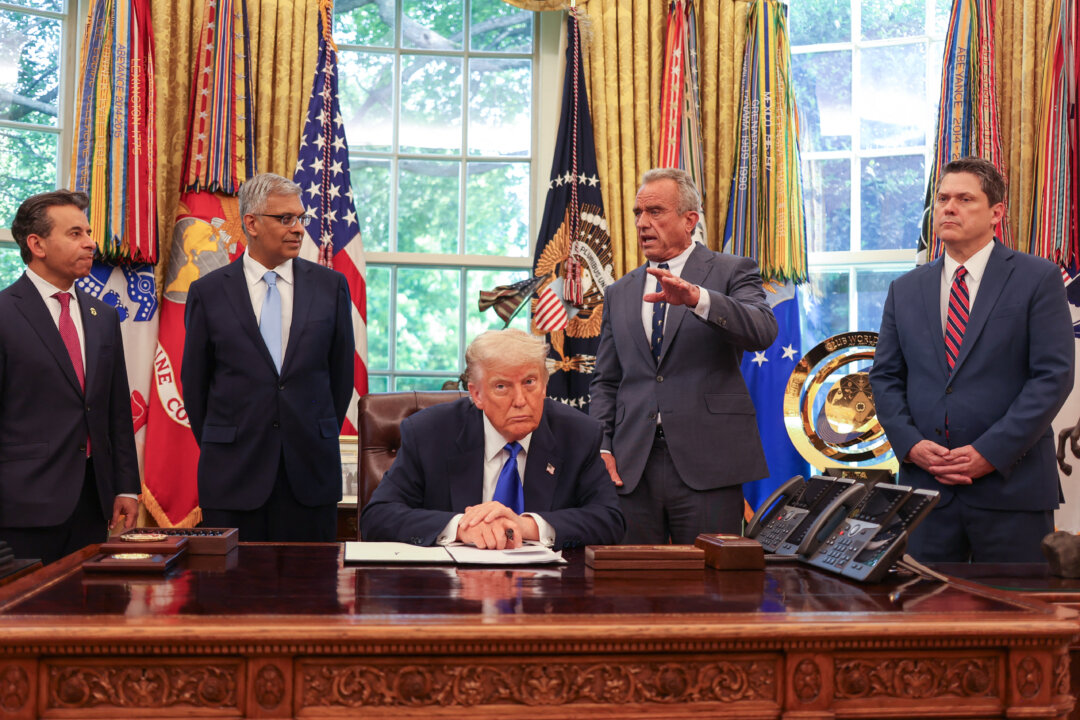A key focus of the executive order is cutting red tape to shorten the timelines for building new plants.
WASHINGTON—President Donald Trump on Monday signed an executive order aimed at boosting domestic production of prescription drugs and reducing America’s dependence on foreign pharmaceutical supply chains.
The order directs the Food and Drug Administration (FDA) to streamline the approval process for domestic manufacturing facilities by eliminating unnecessary regulations and accelerating reviews. A key focus is cutting red tape within the permitting process of the Environmental Protection Agency (EPA).
Trump called the order “very important,” stating that he will make “a big announcement next week” related to pharmaceuticals.
According to a White House fact sheet, the EPA has been directed to expedite the construction of facilities involved in producing prescription drugs, active pharmaceutical ingredients (APIs), and other critical raw materials. The goal is to shorten the timelines for building new domestic pharmaceutical plants by reducing regulatory barriers.
In addition, the order directs the FDA to increase inspections and raise fees for foreign drug manufacturing plants to incentivize domestic production.
Critical barriers and gaps still exist in establishing a resilient, and affordable pharmaceutical supply chains in the United States, according to the fact sheet.
“Industry estimates suggest that building new manufacturing capacity for pharmaceuticals and critical inputs may take as long as five to 10 years, which is unacceptable from a national security standpoint,” the president’s executive order read. “Even expanding existing capacity or modifying existing production lines to produce new or different products requires extensive permitting and regulatory approval, making it more difficult to repurpose existing underutilized pharmaceutical manufacturing capacity available domestically.”
On April 1, the Trump administration launched what’s known as a Section 232 investigation to determine the national security implications of imports of pharmaceuticals and their ingredients. The investigation could lead to tariffs on foreign-made medicine.
The U.S. generic drug supply chain still heavily relies on global production, with a significant portion of ingredients and raw materials sourced from China.
The Chinese regime’s chokehold on America’s supply of critical medicines has been years in the making, driven by Beijing’s strategic push to dominate key industries, systemic issues within the U.S. health care system, and a lack of decisive action in Washington to break this dependence, according to industry experts.
Rosemary Gibson, co-author of “China Rx: Exposing the Risks of America’s Dependence on China for Medicine,” explains that after years of shifting pharmaceutical production overseas, particularly to China, the United States has lost the capability to produce many essential, life-saving drugs.
“We have a system that is perfectly designed for catastrophic failure and significant loss of human life, and that has to change,” she recently told Jan Jekielek, host of EpochTV’s “American Thought Leaders.”
China is a dominant supplier of pharmaceutical ingredients globally. Gibson estimates that the United States relies on China for 95 percent of the key ingredients needed for generic drugs.
Even if the United States were to reduce its reliance on drugs sourced directly from China, it would still need to purchase pharmaceuticals from countries that rely on China for critical components, such as active pharmaceutical ingredients (APIs) and key starting materials (KSMs).
As part of the ongoing investigation, the government is collecting information from a variety of stakeholders, including industry leaders, trade organizations, academics, and other thought leaders.
On April 13, Commerce Secretary Howard Lutnick told ABC News that tariffs on the pharma and semiconductor industries will be decided “in the next month or two.”
He noted that sectoral tariffs on pharmaceuticals and semiconductors are “not available for negotiation” with other countries.
“They are just going to be part of making sure we reshore the core national security items that need to be made in this country,” Lutnick said.

